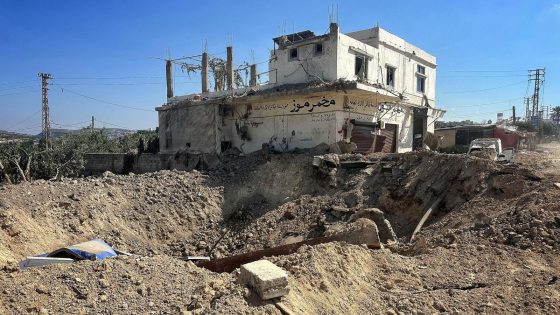Senior US officials have said overnight they expect a ceasefire deal to be implemented “in the coming hours” along the Israel-Lebanon border.
Speaking to reporters in a late-night, last-minute phone briefing, the US administration officials said that exhaustive behind-the-scenes diplomacy had brought an agreement between the two sides close.
One administration official said: “The ceasefire will be for 21 days along the blue line. During those 21 days, the parties will negotiate towards a potential resolution of the conflict that has been ongoing since Hezbollah launched the attack on 8 October, and to reach a comprehensive agreement along the blue line that allows for residents to return to their home in both Lebanon and Israel.”
Middle East latest updates
The official emphasised that this ceasefire proposal was for the northern border only and did not extend to Gaza where Israel’s military offensive against Hamas continues but that a pause in the fighting between Israel and Hezbollah would create the “space” for progress in Gaza.
“It buys some time and space to try to pursue an arrangement in Gaza along the lines of the hostage deal we’ve been discussing,” the US official said.
“We believe, regardless of what has happened on the battlefield over the last several days, the moment we feel is now to achieve that diplomatic resolution; to get there.”
The optimistic suggestion of a ceasefire “in the coming hours” follows a joint statement released by the US, UK, Australia, Canada, the EU, France, Germany, Italy, Japan, Saudi Arabia, the UAE and Qatar which called for the immediate 21-day ceasefire.
“It is time to conclude a diplomatic settlement that enables civilians on both sides of the border to return to their homes in safety,” the statement said, as it warned that “diplomacy, however, cannot succeed amid an escalation of this conflict.”
It’s not clear whether Israel or Hezbollah will agree to the ceasefire. Israel has stated its determination to remove the threat from southern Lebanon.
Asked about this, the US administration official said: “We have had this conversation with the parties… they’re familiar with the texts and we’ll let them speak to their actions. We’re expecting the deal in the coming hours.”
Hezbollah, which is a non-state group aligned with Iran, has been firing into Israel from Lebanon since 8 October in support of Hamas in Gaza.
Israel’s efforts to degrade Hezbollah with assassinations and last week’s pager and walkie-talkie attacks pushed the conflict to a new level with all-out regional war a step closer.
Even if the Israeli government can be persuaded to pause its military objectives, there is no guarantee Hezbollah would do the same. The group’s leader Hasan Nasrallah has pledged that attacks would continue until Israel stops attacking Gaza.
The US and other diplomats have been negotiating with the official Lebanese government and not directly with Hezbollah which they consider to be a terrorist group.
“We negotiate with the sovereign state of Lebanon. They are responsible in speaking for the state of Lebanon and for everything that happens on that side of the border,” the US administration official said.
“Who they negotiate with and deal with, as far as the non-state actors in Lebanon, I think they’re aware of the responsibility that they have to speak on behalf of the country or the state.
“So our expectation is when the government of Lebanon or when the government of Israel both accept this, this will carry and be implemented as a ceasefire on both sides.”
Read more:
Iran ‘a spider in web of violence’
Tensions high as Lebanon faces possible ground assault
British mum fleeing Lebanon with her children
The potential breakthrough came at the end of a day when confused reports from Israel suggested Israeli ground troops might be preparing an invasion of southern Lebanon.
A US Department of Defence spokesperson later said the Pentagon had seen no suggestion of an imminent Israeli operation.
Source Agencies





